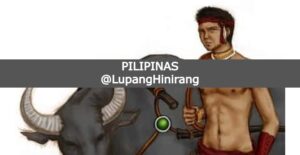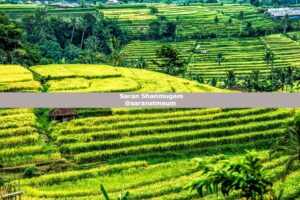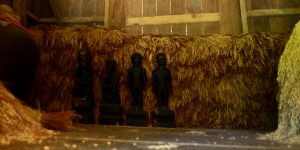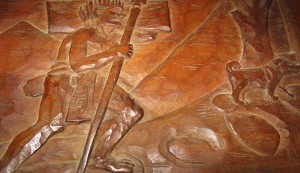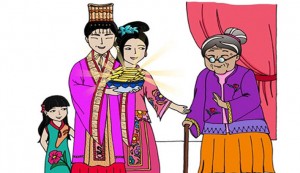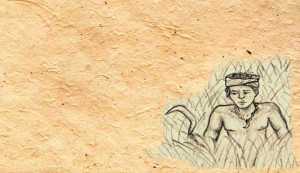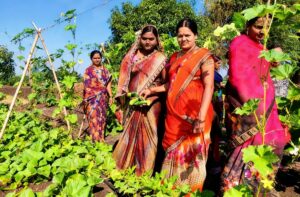
U Nu, Maung Khin’s father, also worked hard, yet money was not plentiful.
“We work very hard, but seem to have few pleasures,” Maung Khin said to his father wistfully. “Maybe, if I go to the city, we can become rich.”
U Nu was hurt and upset, for Maung Khin was his only son, but he understood.
“If you want, go to the city,” he replied. “I wish you health and wealth.”
U Nu gave his son a few silver coins he had saved. Maung Khin packed up. “The city is large, and work there will also be hard,” his father said. “In case we do not see each other again, just remember, the earth bears golden fruit, and only buried treasure is worthwhile.”
Looking fondly at his son, U Nu added, “I wish you well.”
Maung Khin started toward Mandalay. Expectation coursed through his veins; even the name of the big city seemed exciting.
It was several days’ walk to the city. Maung strode along the dusty roads, his head held high.
Maung Khin imagined what lay ahead—Mandalay, riches, good times, all heady thoughts for a farm boy.
 As he reached the city, his excitement rose. The mighty Irrawaddy ran lazily through the city. “What a big river,” he marveled.
As he reached the city, his excitement rose. The mighty Irrawaddy ran lazily through the city. “What a big river,” he marveled.
He had never seen such large buildings and magnificent pagodas, so tall they seemed to reach for the sky. He gaped at the broad streets lined with riotous red flame trees and delighted in the prosperity and wealth around him. He savored the aroma from small eating houses and looked longingly at stores, which lined every street and offered all sorts of colorful wares he had never seen before.
“Soon I will be just like them, wearing bright clothes, and buying whatever I want,” he thought. “What a wonderful place.”
He spent one of his silver coins to eat the best meal he had ever had, and then snoozed under a shady flame tree. When Maung Khin awoke, he stretched and shook his head, throwing off the vestiges of sleep.
“Now, I will find a job and I’ll be rich in no time,” he said.
Maung Khin soon worked as a servant of a wealthy merchant. In the merchant’s house, he saw affluence. His master’s garden abounded in orchids and roses and he saw the master and his friends spending hours of leisure. Although his master was rich, Maung Khin’s wage was small. He saved nothing.
Months, then years, went by.
“Father was right,” he mused. Money is not easy to come by, even in Mandalay.” Sometimes, his thoughts returned to the simple village life and the rice fields.
One day, a stranger came to his master’s house. “I am looking for Maung Khin, the son of U Nu from the village of Mawlu,” he announced to the man who greeted him at the door.
His uncle found Maung Khin in the servant’s quarters. “I’m sorry to bring you sad news,” he said. “Your father died a few days back. His end was peaceful but, before he died, he asked me to find you here in Mandalay and to tell you he had left a large bag of treasure for you at home. It can wait there until you return.”
How Maung Khin wished he could have seen his father again before he died. “My old father remembered me on his deathbed, even though it has been many years since I was home,” he thought. “Now, he is at peace with Buddha.”
From then on, life in the big city seemed even more difficult.
So, Maung Khin decided to go back to Mawlu.
“How did my father come by this treasure?” he thought on his way back. “We were always poor and my father’s house was so small.”
Reaching the village, he went to his uncle’s place. They greeted each other warmly and sat down to chat. They drank tea and nibbled at sweet palm jaggery.
“The sack of treasure your father left you,” his uncle went on, “he made only one condition. That you bury it!”
Maung Khin was stunned.
“This is madness,” he blurted out. “My father leaves me treasure, but says I must bury it? How does that make sense?”
His uncle was of no help and soon went off to sleep. After some time, Maung Khin lay down on his own sleeping mat. Though tired from the long walk, he lay awake recalling the times spent working with his father, and the words, “I looked at only buried treasure is worthwhile.” Next morning, Maung Khin greeted his uncle.
“If it is my father’s wish that I bury his treasure,” he said. “Then, it must be. I must do as he asked.”
His uncle then gave him a large sack, bulging and heavy. Maung Khin was eager to open it. His hand shook as he bent to untie the rope, a thin strip of bamboo, now hardened and dry. When at last the sack fell free, he looked inside.
“What’s this?” he said, standing up. “Has there been a mistake? This is not treasure. It’s rice.”
Maung Khin gaped in disbelief. Then his father’s words became clear. He went out to the fields to prepare the soil for burying his treasure. Maung Khin became a successful and prosperous rice farmer, but before every planting he recalled his father’s words, “Only buried treasure is worthwhile.”
_______________________________________________
Ms. Stilwell is a writer based in Hobart, Australia. This story, originally published in 1959, is part of her forthcoming book, Rice—a grain with many stories, a collection of 28 legends about rice and the many customs associated with this amazing grain.

